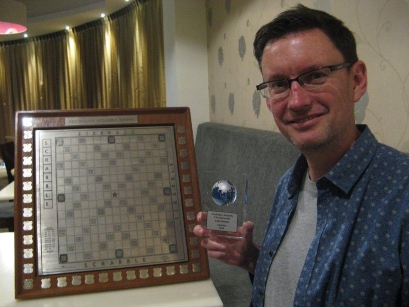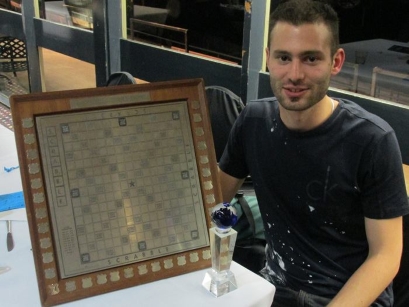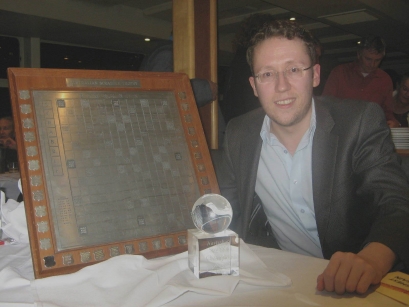WESPA in Profile: Australia
The Australian Scrabble scene has an extensive and very rich past; a base which has brought it to the position it is in today.
Australian Scrabble can be traced back to 1978 in NSW, where the first recorded tournament is played to the Concise Oxford Dictionary. In 1980, the first Moomba tournament was run and was won by Ian Wilson (the Moomba tournaments would eventually form the basis for the Australian National Championships).
In 1981, the first meeting of ASPA (Vic) was held and in 1985, the first newsletter (Across The Board was published). Tournaments initially ran to Chambers and were expanded to a “double dictionary” list in the early 1990s after much debate. CSW15 is the word list used today.
Since those early stages, the Australian Scrabble scene has developed and now has state Associations in all six states and the ACT (only the NT has no Association body) with each division running a number of tournaments throughout the year, meaning the local player is not starved of tournament play for long!
The most prestigious of these tournaments is the Australian National Championships, which usually runs over the Easter period (24 games). It has been won (in all versions) by around 20 different players (including two overseas players, Cheah Siu Hean and Tony Sim). It is now run in two divisions: a Championship and a Plate Division so this event caters for players of all levels. You can view past winners here
 Up until 2016, the only tournaments rated by WESPA were the Nationals, the City of Sydney International Masters (CSIM, run in January) and the Australian Masters/State Challenge (usually run later in the year). In addition, the biannual Trans Tasman Challenge (played against NZ - the 2016 Oz team is photographed right) also attracted a WESPA status. The Trans Tasman Challenge has been going since 1996 with Australia retaining the trophy in 2016.
Up until 2016, the only tournaments rated by WESPA were the Nationals, the City of Sydney International Masters (CSIM, run in January) and the Australian Masters/State Challenge (usually run later in the year). In addition, the biannual Trans Tasman Challenge (played against NZ - the 2016 Oz team is photographed right) also attracted a WESPA status. The Trans Tasman Challenge has been going since 1996 with Australia retaining the trophy in 2016.
Since 2016, this was also expanded to include all State Championships (excl Queensland and ACT). Australian Scrabble prides itself on its ability to attract international players to their events. The Nationals has attracted players from Singapore, Malaysia, NZ and Nigeria to name some countries with the CSIM also attracting international players through the years (Nigel Richards won the 1999 CSIM).
In addition to these tournaments, in 2015, Perth played host to the inaugural WESPAC, which was won by Wellington Jighere, and hosted a WSC in Melbourne in 1999. Going back a few more years and Australia played host to an Australian championships in 1986 where players entered through a national competition advertisement in a leading women’s magazine. Players vied for the chance to head to the US to take part in a prominent tournament there (the US players represented in Melbourne were Chris Cree and Bob Schoenman).
At a local level, longevity of playing career amongst players is not uncommon. Eg, one of the first instances of a 700+ game (and the first recorded in Australia) is John Holgate’s 728 against John Barker in 1983. Both players are still active on the scene today. (As an aside, the highest score in an Australian tournament is Russell Honeybun’s 764).
On the international stage, Australian players have been ever present and supported the international scene. In 1989, six Aussies headed to the US to play a tournament and 5 were represented in the first ever World Scrabble Championships in London in 1991. Australians have travelled abroad to play in tournaments in the UK and Europe, Asia and the US (in addition to the World Championships run every 2 years).
Players like John Barker, Karen and Paul Richards, Carol Johnsen, Russell Honeybun and many others have played tournaments across the globe. The 2016 Causeway Challenge was well represented by Australian players eager to play in one of the most exciting international tournaments of 2016. Undoubtedly, with the Australian players’ love for travel, this support for the international Scrabble community will continue well into the future.
 No Australian has won a world title though there have been amazing performances on the world stage. In 2011, Andrew Fisher (representing Australia) came runner-up at the WSC in Warsaw. At the World Youth Scrabble Championships, there have been three Aussies who were successful (David Eldar 2006, Anand Bharadwaj 2011 and Michael McKenna in 2012). Alastair Richards (pictured left), was a runner up at that event in 2009 and victorious in the individual titles at the 2016 Trans Tasman Challenge. David Eldar won the CSW division at the North American Scrabble Championship in 2016. Esther Perrins finished 3rd at the 2015 WESPAC.
No Australian has won a world title though there have been amazing performances on the world stage. In 2011, Andrew Fisher (representing Australia) came runner-up at the WSC in Warsaw. At the World Youth Scrabble Championships, there have been three Aussies who were successful (David Eldar 2006, Anand Bharadwaj 2011 and Michael McKenna in 2012). Alastair Richards (pictured left), was a runner up at that event in 2009 and victorious in the individual titles at the 2016 Trans Tasman Challenge. David Eldar won the CSW division at the North American Scrabble Championship in 2016. Esther Perrins finished 3rd at the 2015 WESPAC.
At a WESPA level, there are five Aussies who hold a position at a global level. Andrew Fisher and Karen Richards are on the Main WESPA Committee, Bob Jackman is on the Tournament and Rating Committee, John Hamilton on the Rules Committee and Nick Ivanovski is Chair of Promotions.
Karen also chairs the Youth Committee and many players throughout the globe, of all ages, would be well aware of her longstanding enthusiasm and continuing dedication to the sport, encouraging young players to get involved and participating at the World level.
Long time player Barry Harridge is also known for his web expertise on a domestic and international stage.
For those who want to know more about the Australian tournaments on offer, the website is your place to go. There are also a handy sections on resources and words to help you improve your game. The tournament scene, you will find, is regular and the country is home to a number of the best players in the world, including 13 of the top 100 ranked on the WESPA ratings list as well as a dedicated group of players at all levels always welcoming to a fellow player.
As a postscript, no profile on Australian Scrabble would be complete without mentioning Bil Rose, a player who, at the time of his passing in 2005, at 98, was in the Guinness Book of Records for being the oldest known tournament player. A tournament in his honour is played each January in his home state of Victoria.
 |
 |
 |
Recent Australian Champions (from left-right) 2016 Trevor Halsall. 2015 Peter Kougi. 2014 Daniel Piechnick. 2013 David Eldar